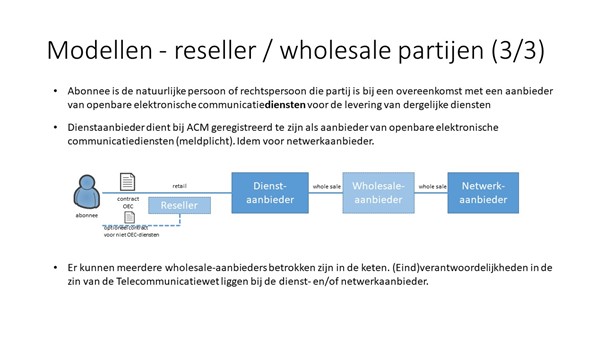What is an expression of will for number porting or switching?
- by Qupra Wholesale B.V.
- in COIN transfer
- on August 15, 2021
An expression of will is a digital statement of the customer and the will of one offer to switch from the other. This declaration of intent is often received and later confirmed in writing; the will suit
What requirements must an expression of will meet?
From COIN CHANGE REQUEST NUMBER 1275 version, includes 6 conditions that the power of attorney or expression of will must meet, and that are in line with the 2018 policy rules.
The power of attorney for porting and/or provider-driven switching must meet the requirements of statutory regulations and contain, where relevant in addition to these requirements, at least:
• Name, address and place of residence or place of business of the subscriber and in case of number retention the telephone number(s) to be ported, or only the telephone number(s) to be ported of the subscriber in case of agreement(s) for anonymous prepaid service(s);
• Company, brand or trade name of receiving service provider;
• Date on which the power of attorney was issued;
• That the subscriber authorizes the receiving provider to take care of the switch on his behalf and to cancel the agreement(s) desired by the subscriber between him and the transferring provider with regard to the provision of publicly available electronic communications service(s) on his behalf;
• If a power of attorney is granted for the premature termination of the agreement(s) with the transferring provider, the power of attorney shows that the subscriber has been explicitly informed about a possible redemption sum and that the subscriber has expressly agreed to bear any costs thereof;
• If applicable, that the subscriber requests number porting.
Expressions of will and permissions: Who is authorized by the porter/customer
The customer must authorize the party from whom he will receive the invoice for number porting / number porting. In other words: the service provider is authorized to carry out what is considered logical for the migration of the number; terminating the old agreement and migrating the number to the new network.
Expressions of will: in practice it works differently
Requested statements of will from, for example, Routit also show that the statements of will provided by Routit/KPN itself, among other things, the expression of will of telephone number 01834430XX explicitly authorizes Routit/KPN to port the number and not another party that acts as the reseller of Routit/KPN. Routit/KPN and its resellers are therefore not doing well here.
Also with the number 02040XXXX it appears that Routit/KPN is authorized by the customer, and that Routit/KPN agrees with this is apparent from the fact that it submits this statement of will.

Of the 25 total requested expressions of will, 9 were delivered in total. Of these 9, 1 does not provide clarity about who the acquiring party is, and 3 mention Routit/KPN. Routit/KPN therefore supplies less than half of the requested expressions of will, based on the SP code submitted with porting (ie VOIP:Routit), 2 have been entered correctly on the basis of COIN rules.
Who is authorized by the porter/customer to transfer the number?
The customer authorizes the Service Provider’s partner for porting and number switching. The reseller is therefore responsible for the expression of will. This “reseller” must then be mentioned as the service provider in COIN’s message traffic. If this does not happen, “the reseller” / service provider for Qupra CS. unknown, and it cannot directly contact the “reseller” who is the service provider for any questions about the expression of will. In that case, the network provider that presents itself as a service provider is responsible for the correct expression of will. The reseller/partner is therefore primarily responsible. This follows, among other things, from the COIN regulations and the 2008 number portability policy rules (ACM).
Article 5. Providers are responsible for the information to and for the behavior of the persons and companies they engage when concluding, amending and terminating contracts with end users of the public electronic communications services designated for number porting.
With explanation
Article 5
Mobile telephony, and lately also VoIP, is also sold through third parties (auxiliaries). The customer can perform all actions with the auxiliary person to obtain the service. This article emphasizes that providers are responsible for the assistants they engage to conclude, amend and terminate agreements with end users on their behalf and that number portability must therefore also be possible in these cases. In addition, the provider of the service (and not the auxiliary person) remains the person on whom the legal obligation rests for the provision of number portability. The providers must therefore provide these assistants with the correct information and resources.
Who is responsible and when for the expression of will regarding number porting?
From the standard porting agreement follows:
5.1 The recipient warrants that it is authorized by the porter to terminate the contract between the porter and the donor regarding the provision of a telecommunications service on behalf of the porter, and to request the donor who holds the number to porting that number.
5.2 Before the recipient with whom the porter wishes to enter into an agreement for the provision of public telecommunications services, submits a request for porting of a number to the donor, the recipient must ensure that he has proof of his will showing that the recipient is authorized by the porter and which proof must meet the applicable criteria as established in the methods and procedure of authorization as defined in the documents.
Research & control in practice between 2017 and 2021 shows:
It appears from the submitted wills that the will often AFTER the request of Qupra CS. is “constructed” . This confirms the picture at Qupra CS. that it is impossible (on the basis of this expression of will by the recipient (recipient)) prior to the request for porting in accordance with Article 5.2, to have ascertained a written conclusive expression of will.
What stood out is the following:
The date of the will is later than the initial request for porting.
Of the 25 requested statements of will from this party, 9 were submitted, of the 9 statements of will provided, 5 were statements of will of a later date than the porting request.
There has been no prior check by this telecom reseller on the correctness of the expression of will
Portions are requested by non-ACM registered parties
Porting is requested “immediately” while the expression of will shows that the customer wishes to transfer “at the end of the contract date”.
Can the reseller be responsible for the expression of will in a COIN context?
No, contrary to what KPN or other Telecom resellers sometimes claim, only the service provider (SP code) that requests porting is responsible for having a correct expression of will. The fact that in practice the service provider is often a reseller that is not registered anywhere creates a lot of uncertainty. This alone for the simple reason that Routit/KPN &, for example, Motto do not disclose which other party that would be on its behalf, ensures that Qupra CS. does not know that it concludes a porting agreement with a party other than Routit/KPN. In practice, the reseller does act as a service provider, but is not registered as such with COIN, which causes all kinds of misunderstandings.
The recent minutes of COIN’s June 2020 COIN CCB also show that KPN and COLT also confirm this:
Mr. C. (COLT) notes that the document makes no distinction between service provider and network provider. When a service provider uses a network provider, it is possible that the power of attorney is not within reach of the network provider. In this situation too, the responsibility for the power of attorney rests with the service provider. This concerns the service provider as announced in the porting process (SP code).
mr. Van H. (KPN) agrees that the responsibility for the power of attorney rests with the service provider and that it should not refer to third parties engaged by it (such as resellers and/or network providers). It is reiterated that prior to submitting a switching or porting request, a service provider must have an adequate power of attorney, which must be submitted without delay after request. The party with which the power of attorney is stored/stored relates to process equipment, for which the service provider is ultimately responsible.
Reports from COIN & Fist (both associations of telecom providers) also show the attached diagram:

Is the reseller responsible for following the COIN rules?
Yes, if it concerns a reseller who invoices on “own book” and is therefore a service provider. And no, not according to the above, not according to COIN. But that is a process error and a question of definition: after all, COIN has no resellers, and concludes that the resellers, as Routit calls its partners, are service providers (SP code). Routit and Voiceworks do hold the reseller contractually responsible and impose fines on this. Without saying what the In other words, as long as you are not registered with COIN as a reseller/partner of, for example, Routit or Voiceworks, they have to take responsibility for the transfer requests submitted by the “reseller” with regard to the counterparty (Donor) in COIN. In fact, the “resellers” do act as service providers and should be registered by their telecom reseller at COIN and independently at ACM.
Do you need help with your ACM of COIN registration?
It’s not nothing; switching requests, in fact the “resellers” do act as a service provider and should be registered by their Telecom reseller with COIN and independently with ACM. This is a process that you have to “go through” as a reseller. We are happy to help you with it. Leave your details via https://quprawholesale.com/reseller-partner/acm-coin-registration and we will organize the rest.
